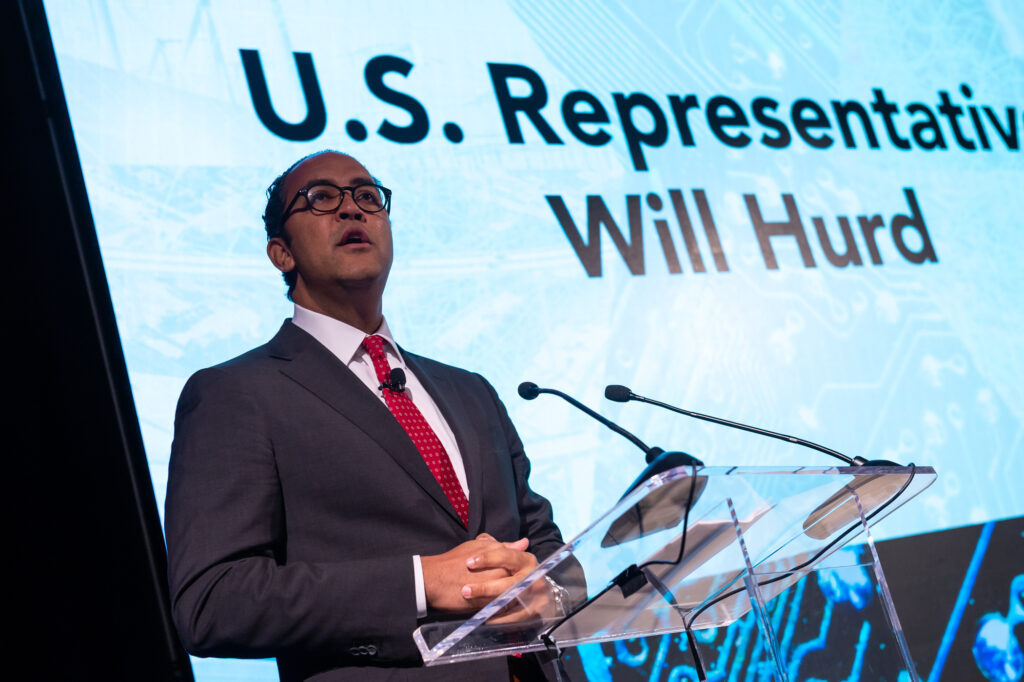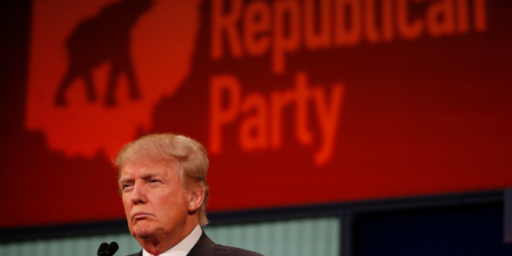A Recurrent Political Fantasy
Magically mobilizing nonvoters isn't going to happen (but it sounds nice, I suppose).

The Atlantic has an interesting profile on former US Representative Will Hurd (R-TX): The Revenge of the Normal Republicans, which includes discussions of his time in Congress, his new book, and his political ambitions. The subtitle is as follows: “Will Hurd thinks there are enough normal voters to deliver him the 2024 Republican presidential nomination. But is he right?”
If you don’t want to read the rest of the post, I will go ahead and answer the question.
The answer is “no.”
(And it isn’t even even really the right question, even if it is a recurrent fantasy in our politics).
The basic notion is as follows:
What Hurd doesn’t know is whether America is ready to buy what he’s selling. The nation has been lulled into long-term complacency by elected officials and special interests and media personalities that have short-term motivations. The most engaged voters in his party—the people likeliest to cast ballots in a presidential primary—are, to varying degrees, addicted to the fear and grievances being peddled by people clinging to relevance. Hurd realizes that breaking this addiction won’t be easy. In fact, it might prove impossible.
He does, however, see another path forward—one that depends less on persuading those hardened partisans and more on mobilizing a different kind of voter. The overwhelming majority of conservative people in this country, Hurd says, are not watching Fox News every night or imbibing conspiracy theories online. They are not politically neurotic. In fact, they may have never voted in a primary to choose a nominee for president—and that’s the point. “They have been busy trying to put food on their table, put a roof over their head, take care of the people they love,” he says. “But now they’re getting fed up. They are tired of everybody. They are ready for something different.”
Like what?
“Something normal,” Hurd says.
Emphases mine.
To start with, I emphasized “short-term motivations” because that is inherent to politics. Of course politicians (indeed, on balance, human beings) are short-term thinkers. Short-term rewards are enjoyed, you know, in the short term. Meanwhile, you have to wait for medium- and long-term goals. Heck, you might be out of office or even dead when those goals come to fruition. Also, as I have noted before, we elect House members to two-year terms. The motivation for short-term thinking is baked in.
In regards to his specific approach, part one of his plan is to mobilize people who have not been voting. Part two is to assume that those voters all want the same thing, and it just happens to be what Hurd is selling.
Setting aside that mobilizing millions of non-voters into action is, to put it mildly, not easy to do, there is a version of the pundit’s fallacy at work here (or the moderate’s fallacy, or the independent’s fallacy) and that is that all those non-voters out there must surely want what I want. But, of course, they all want any number of things, almost certainly none of which are what I want. And why do moderates always assume that all the non-participants must also be moderate (and their personal flavor of moderate, to boot?).
Indeed, by definition, “normal” above is simply what Hurd thinks it should be. But, alas, we all tend to think that we are the normal ones (which utterly undercuts the actual definition of “normal”).
At any rate,
He’s not under any illusion that consensus will magically appear. But he does believe that most voters—what he describes as the 80 percent clustered within range of the middle—are tired of being presented with binary choices when it comes to big, complicated questions.
That is just quite the assumption. While I will readily allow that 80% may be frustrated, there is no reason to believe that they are all frustrated for the same reason, let alone that they form a coherent voting bloc. As I frequently note, yes, a lot of people call themselves “moderate” or “independent” but that simply does not mean that they are a homogeneous group.
Further, this type of fantasy is tantamount to a guy who wants to be an NFL coach asserting that he has a new system, which is guaranteed to win, but all that it needs to work is for everyone (opponents included) to play the game in a way that is fundamentally different than it has been played for decades.
Look, I agree that there are more than two political groups of people in the US and that given the option we would have more than two parties. But, that is not going to happen under the current rules of the game. When it comes to selecting presidents both the nomination process and various aspects of the Electoral College utterly mitigate against multiple parties.
BUT, to be clear, the current rules of the game funnel voters in very specific ways while, at the same time, creating incentives for office-seekers to stay within the two-party framework. Wishing that a bunch of people who are already not motivated to participate will show up, whilst hoping that they are a homogeneous group that just so happens to think like you do, is no strategy to overcome the structural conditions of American party politics.
One thing I will say about Hurd, he is the type of politician I wish we had in Congress: the kind who actually thinks that the purpose of Congress is to solve problems. But that is not enough to overcome the current incentive structure of our system. Moreover, while there may be a lot of people who, in that abstract, think that Congress should solve problems, the fight always begins as soon as the conversation moves from “let’s get things done!” to prioritizing which problems to solve, and then, the kicker of how they should be solved.






I think Al Franken’s observations about Arlen Specter in the 1996 Republican primaries apply here.
On reading the Hurd piece, my thought was; what is this man smoking and I want some. Tim Miller, in sadness, destroyed Hurd at the Bulwark the other day, by and large saying that the R’s that Hurd wants are either now voting Dem or will never vote.
Polls looking at the 2024 show that ~55% of R’s want TFG, ~20% DeSantis, the rest, Cruz, Cotton, Hawley, Pence and Pompeo are around 15-20% in total. It is hard to see where Hurd sees a path. I guess he could say it is the voters who supported Charlie Baker, Chris Sununu, Phil Scott and Larry Hogan, but for none of those was it R’s that delivered their victories.
@Sleeping Dog:
I think he’s been smoking rose-colored glasses.
@Sleeping Dog: @Kathy: My sense is that pieces like this are due less to wishful thinking than to contrarianitis.
I don’t know, I think the Republicans can have their own version of Marianne Williamson in the primary.
@Kylopod:
I don’t know. Hurd is awfully young to be standing there, shaking his fist, yelling, “get off my lawn.”
I’m mildly alarmed that a former clandestine officer could be this off-base. 😀 They’re supposed to be really good at observing things and coming to solid conclusions.*
*I know a number of former clandestine officers and know for a fact that they are typically very observant.
I want to like this guy, but let’s be realistic. All you have to do to win the presidency right now is to get nominated by one of the two parties and then win the general. It’s a given that Republican primary voters would never elect him, but he most certainly could run in the Democratic primary and have a real shot at winning. There are not Super Delegates anymore! He just has to win the primary, and if he can’t do that, what does that say about his chances of winning the general. I read the article and all he never really brought up anything specific he wanted to accomplish, so it’s hard to tell if he really is incompatible with both parties (I sincerely doubt it) or that he just doesn’t like the idea of them.
Maybe it’s my lack of imagination but I honestly can’t see why coming in as an independent is a better path or would allow you to achieve more of your goals than simply registering as a Dem and coming in that way.
@MarkedMan: Let me just add to my diatribe above: If someone is a real “change” candidate then they will do what it takes (within ethical boundaries) to pursue those actual, specific changes. If someone starts with, “well, I’ve been a lifelong member of Team A and I just can’t be part of Team B”, that just tells me that whatever compels them it isn’t a burning desire for policy change. Because if it was you would join whatever team allowed you to get to your goals, never mind if they have cooties.
The fantasy of the magical middle ground political party is evergreen in America. But the numbers don’t add up. ~80% of the R’s and R adjacent independents are happy with the direction of the party. If the rest were open to a new party and that party could somehow capture 50% of the Dem/Dem adjacent voters, that still wouldn’t give you a governing coalition.
With first past the post, there is potential to win the presidency, but not a legislative majority. Then there is the Federalism problem and voter sorting. Except for what, 10 purple states, one party or the other dominates state government, leaving no incentive for change at that level.
@Jen: If someone is this far off base, and seems to be generally intelligent, I assume that they are playing a different game than I initially thought.
He isn’t going to win the primary. Zero chance.
Either he wants to do a Quixotic run for principle, to make sure that there is a reasonable choice represented or something, while knowing he will lose, or it’s a grift.
Non-voters aren’t going to start voting. Not en masse. Not enough to change the primary and a partial victory in the primary is just a loss.
But, the disengaged are an untapped market for the right wing grift machine — a hard to tap market, to be sure, but untapped. There are people trying to reach into that market and pull them into the far right grift machine, with Ivermectin and Q and the like, but no one trying to meet them where they are. So, he has the lane to himself.
And, in the grifting game, a partial victory is money in your pocket. There’s no 50%+1 or 15% minimum or other complicated rules that cut a small to medium grift to zero.
I think the conservative Democrat and former Republicans might be the better target than the non-voting vaguely Republican. They are engaged, but underserved.
Look at what our own Dr. Taylor writes in this very post:
Look at the recent posts of Dr. Joyner where his Republican nature is poking up a little bit now that the complete boorishness of Donald Trump is gone. He wants this, or something like this.
Anyway, my guess is that Hurd has no expectations of political success. It’s a nice mixture of an idealistic, yet Quixotic run to try to re-establish a reasonable wing inside the Republican party, and a grift.
I think the target audience for the grift is people a little bit less realistic than our fine Drs Taylor and Joyner, but in the same vein.
Grift might be too strong of a word. “Selling people a lifestyle” might be better.
@Gustopher:
Agreed.
This whole idea of running to surface some magic hidden number of moderate Republicans just feels a bit whimsical (if I’m being nice) or delusional (if I’m being honest).
It reminds me very much of discussions with my father, who remains utterly convinced that most Republicans out there are “like him,” (meaning fiscally conservative, and while not opposed to societal and culture changes, would prefer them to be bottom-up rather than legislative or regulatory initiatives) despite all evidence–mountains of it–to the contrary.
Republicans like Hurd and my father (and I believe perhaps even our hosts here) are correctly horrified at what the Republican Party has devolved into.
It’s a bit of magical thinking to believe that there’s a way out of this that uses the current party label. That ship has sailed. Hurd’s efforts would be better spent working to elect Democrats to the point of decimating the Republican Party utterly and completely, with an eye to build it into something else once the loons, whackos, and nutjobs have been purged or give up on politics.
@Gustopher:
Or he believes he can win. We can’t underestimate the power of delusion among politicians. They all live in their own personal echo chamber, surrounded by people constantly telling them how great they are, always able to find media pieces (such as this one) willing to further a narrative they favor.
And yes, centrism (however loosely it’s defined in practice) is one of the most self-congratulatory echo chambers out there. It’s practically defined by a belief, completely immune to evidence, that it’s the true silent majority and a political behemoth in waiting. They don’t need evidence when their entire credo is defined by being the most reasonable person in the room. How do we know Reasonable Centrism is most the most reasonable option? Because it says it right there in the name–Reasonable! And we believe the American People are a reasonable people and tired of the rah-rah extremism on both sides of the aisle…. The Reasonable Centrists will rise, because they are reasonable.
There’s also a strong bias toward this framing in the mainstream media.
Bernie’s plan
That worked well didn’t it.
Sometimes the point of someone’s presidential campaign, and what their fundraisers understand them to be doing, is just to put someone onstage who will represent and articulate a point of view. And if they get some votes in the primary, that means some validation for that point of view.
In another polity, they’d form a separate political party and run that way. But that’s a non-starter in the US, as Dr. Taylor frequently points out.
@Jay L Gischer: Something else to consider. A few months ago Ted Cruz said that in Republican primaries, the winner is usually the runner-up from the previous cycle. Ed Kilgore did a piece in which he convincingly argued that this “rule” is much less than meets the eye, and in fact it’s not much of a rule at all. What is true, though, is that many nominees in the modern age were people who had run for their party’s nomination in a previous cycle (sometimes more than one, as in Biden) and failed. So there is some merit to the idea that running can be a way of raising one’s profile for a future cycle.
@Kylopod: I thought Cruz was simply trying to position himself as runner-up so that he could start the campaign by declaring himself as the obvious favorite/best choice.
When I read the piece this morning, the thing that jumped out at me was a former CIA officer and not one word about climate change. We’re seeing the beginnings of water wars and climate-driven migration. The western forests are burning down and the authorities are implementing water emergencies in California and the lower Colorado River basin. We’re seeing increased coastal flooding. No Democrat, no matter how centrist, would have been let off the climate-change hook.
@just nutha:
That was his argument: that because he was the runner-up in 2016, he’s likeliest to be the nominee in 2024, just as Romney was the runner-up in 2008 and nominee in 2012; McCain was the runner-up in 2000 and nominee in 2008; and so on.
Of course, Rick Santorum was the runner-up in 2012 and his 2016 campaign went nowhere; Pat Buchanan was the runner-up in 1996 and didn’t even run for the GOP nomination in 2000. (He was also technically the runner-up in 1992, but I’m not sure if that counts, as he was challenging a sitting president from his own party, though no doubt some people thought he was following the Reagan model of using such a challenge to launch a successful run in the next cycle; obviously that didn’t happen.)
Kilgore’s piece went into more detail about why the pattern is less than meets the eye, even for the examples that appear to fit. For instance, George H.W. Bush was the runner-up in 1980 and nominee in 1988, but his being the sitting vp was probably the more important factor. And while McCain did win the 2008 nomination after failing to do so in 2000, it was heavily dependent on a demolition derby in which his rivals sort of canceled each other out. (It was also dependent on the sitting vp Cheney not running, nor any hand-picked successor from the Bush Admin.)
The bottom line is that being a runner-up in the primaries usually doesn’t hurt when it comes to future runs, but it’s far from from any guarantee of success. If Trump doesn’t run, I don’t think the zeitgeist would be for Cruz, though at least he’s a touch more plausible than Hurd.
@MarkedMan:
He probably couldn’t really win. Had anybody even heard of him before now? But yes, he could as a moderate, if he really is, run comfortably as a Dem. This, “I’m a moderate but I could never vote for a Dem.” stuff is proof of how good GOP messaging is.
I just reread the article and I have to call B*llsh*t. Nowhere does he mention a single specific thing he would do. He talks about issues we must take seriously, and bemoans the acrimony in politics. What, he wants a genius award for that diagnosis? He appears to be the same as every other “centrist” candidate: his platform consists of explaining just how tired he is of everyone else’s bad behavior. If he was in power, well, he would… something.
@gVOR08: Sure, he probably wouldn’t win. Join the club of everyone running for President. But he has a heck of a lot better chance as a major party nominee than as another 3rd party vanity candidate.
@Kylopod: When have facts or reality ever coincided with whatever nonsense Cruz was peddling except as an incidental feature/happenstance? (Not a criticism of your observation, merely a comment.)
@MarkedMan: Your reaction matched my reaction at reading the lede–“okay, tell me what moderate positions you support so I can tell what you think “something normal” looks like. It might be that he’s onto something. Given that he’s still claiming the GOP mantle, it’s more likely he’s merely on something.
@just nutha:
The thing is, this is one of the more reasonable things Cruz has said. It’s flawed, but it isn’t insane. It’s the type of argument many Democrats have made over the years about various candidates. It’s basically in line with a lot of mainstream punditry (which is always trying to suss out patterns from superficial analyses of past elections–remember the “blue wall” argument in 2016?). My point is that potential candidates always try to construct a narrative for their viability, and there are plenty of relatively mainstream sources out there bolstering those narratives.
@MarkedMan:
Maybe it’s time to found a Captain Obvious Award for Pointing Out What Everyone Can See.
@just nutha: Vacuous policy hasn’t seemed to stop too many of these “I’m a moderate – like you!” candidates. I present Glen Youngkin as evidence that merely saying you’re a centrist can pull enough sucker votes to you that you don’t have to articulate a real agenda.
@ptfe: I thought Glenn Youngkin articulated a real agenda. He was pitching Trump lite.
@Just nutha ignint cracker: His stated agenda was almost entirely “I’m not Trump, but masks and CRT are bad.” His website had the removal of state tax on food. That was it. Policy? Nah.
(His actual policy is, in fact, Trump lite. That’s a different problem.)
He didn’t need it. Just saying masks and CRT were evil… Enough for the 50% who weren’t going to check either website.